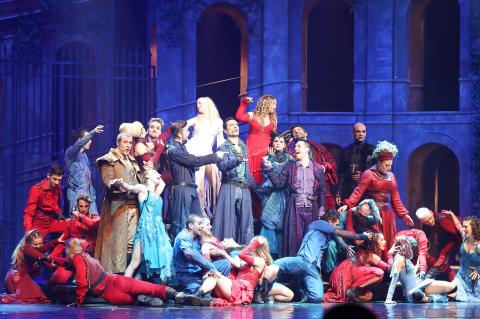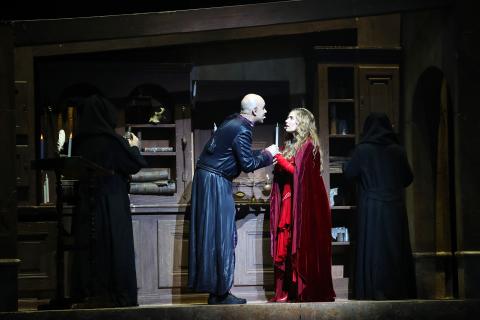It seems that almost everybody loves a great love story — if the millions of people around the world who watched a wedding in Windsor, England, on Saturday last week are anything to judge by.
Or the millions who have flocked over the past 17 years to see Gerard Presgurvic’s pop opera retelling of another English love story, William Shakepeare’s Romeo and Juliet, even if it is set in medieval Italy.
Presgurvic had made a few short films and scored others, but nothing achieved the level of success that he hit with Romeo et Juliette de la Haine a l’Amour, his first musical. While his later musicals have been on a similarly grand scale, including The Ten Commandments and Gone With the Wind, they have not matched the peak set by his first.

Photo Courtesy of Romeo Productions
He wrote the book and score in 1999, although the show did not premiere until 2001 in Paris. Several of the songs from the original show became huge hits in France and elsewhere, including Aimer (Loving) and Les Rois du Monde (The Kings of the World), as have others added to subsequent production in France and abroad over the years.
While media information packs labeled the show, and its various revampings, as “the classic French musical,” Presgurvic’s Romeo Productions Web site calls it “a musical comedy.”
Perhaps it is a way of saying that if a French bard had written the tale, it would not have ended so badly for the young lovers.

Photo Courtesy of Romeo Productions
Several previous versions of the show have visited Taipei, starting in 2007 when the company launched its first Asian tour; the last visit was in October 2016.
The young lovers and their feuding families are back at the Sun Yat-sen Memorial Hall for an 11-show run of what is now titled Romeo & Juliette, les enfants de Verone.
The original Romeo from the Paris premiere and 2007 Taipei visit, , Damien Sargue, is also back, although minus the long flowing locks of his younger years, and without his original stage Juliette, Joy Esther, with whom he was briefly married.
Sargue, who turns 37 next month, was so popular in Taiwan and South Korea that he even in 2007 released an eponymously-titled CD locally in addition to making concert appearances in Taipei and Seoul.
There will be some other familiar faces in the cast to those who have seen earlier incarnations of the show, many of whom were here two years ago: Clemence Illiaquer as Juliette, Gregory Gonel as Benvolio, Nicolas Turconi as Tybalt, Bridgette Venditti and Moniek Boersma as the two rival mothers (Montegue and Capulet respectively), Juliette Moraine as Nurse and Frederick Charter as the Prince of Verona.
Among the newer faces are John Eyzen as Mercutio, Christophe Herault as Lord Capulet, Stephane Metro as Friar Laurence and dancer Justine Catala as Death.
Having seen the show in 2007, I would describe it as more of a rock opera with a lot of broad comedy, dancing and somersaults, plenty of long coats for the men — almost all of whom have chiseled cheekbones and wash-board abs, and high-cut skirts and low-cut corset tops for the female dancers, while the females leads wear a variety of gothic-rock outfits.
More camp than high art, the show is great fun, even if the cast does sing along to a recorded soundtrack. I just do not understand why Death has to be a dancer swanning around atop the set in a filmy nightgown.

April 28 to May 4 During the Japanese colonial era, a city’s “first” high school typically served Japanese students, while Taiwanese attended the “second” high school. Only in Taichung was this reversed. That’s because when Taichung First High School opened its doors on May 1, 1915 to serve Taiwanese students who were previously barred from secondary education, it was the only high school in town. Former principal Hideo Azukisawa threatened to quit when the government in 1922 attempted to transfer the “first” designation to a new local high school for Japanese students, leading to this unusual situation. Prior to the Taichung First

Chinese Nationalist Party (KMT) Chairman Eric Chu (朱立倫) hatched a bold plan to charge forward and seize the initiative when he held a protest in front of the Taipei City Prosecutors’ Office. Though risky, because illegal, its success would help tackle at least six problems facing both himself and the KMT. What he did not see coming was Taipei Mayor Chiang Wan-an (將萬安) tripping him up out of the gate. In spite of Chu being the most consequential and successful KMT chairman since the early 2010s — arguably saving the party from financial ruin and restoring its electoral viability —

The Ministry of Education last month proposed a nationwide ban on mobile devices in schools, aiming to curb concerns over student phone addiction. Under the revised regulation, which will take effect in August, teachers and schools will be required to collect mobile devices — including phones, laptops and wearables devices — for safekeeping during school hours, unless they are being used for educational purposes. For Chang Fong-ching (張鳳琴), the ban will have a positive impact. “It’s a good move,” says the professor in the department of

Article 2 of the Additional Articles of the Constitution of the Republic of China (中華民國憲法增修條文) stipulates that upon a vote of no confidence in the premier, the president can dissolve the legislature within 10 days. If the legislature is dissolved, a new legislative election must be held within 60 days, and the legislators’ terms will then be reckoned from that election. Two weeks ago Taipei Mayor Chiang Wan-an (蔣萬安) of the Chinese Nationalist Party (KMT) proposed that the legislature hold a vote of no confidence in the premier and dare the president to dissolve the legislature. The legislature is currently controlled